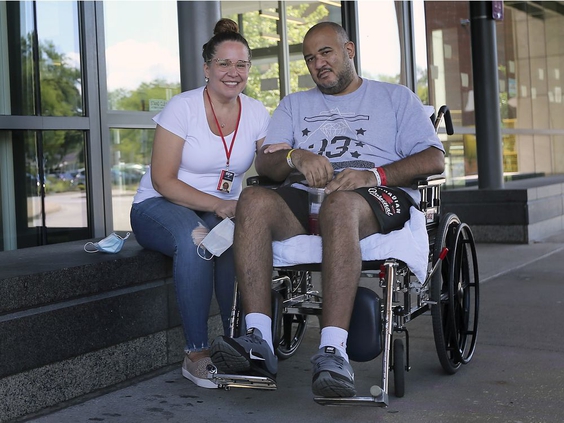Aug 08, 2020

Heidi and Torry Robertson of LaSalle are shown at Hôtel-Dieu Grace Healthcare
in Windsor on Friday, Aug. 7, 2020. DAN JANISSE / The Windsor Star
It began March 25 with a fever.
Four months later, Torry Robertson, a 45-year-old nurse from LaSalle who contracted COVID-19, is learning to walk and talk again and struggles to concentrate.
His fever rising and blood oxygen falling, Robertson was rushed by ambulance to Windsor Regional Hospital on March 30. Three days later, he was transferred to the intensive care unit and hooked up to a ventilator. He spent almost six weeks on a ventilator.
When he was finally released from Windsor Regional July 14, he didn’t go home. He was transferred to Hotel-Dieu Grace Healthcare, where he’ll stay for weeks more, undergoing physical, occupational and speech therapy.
He has had encephalopathy, multi-organ failure, blood clots, gastrointestinal difficulties, blood infections. At one point, doctors warned his wife, Heidi, to prepare for the worst.
“I’m just so relieved he’s alive,” she says.
He was luckier. He never needed a ventilator. He was out of the hospital in 10 days.
But four months later, it wasn’t over.
The man complained of “brain fog.”
“They just seemed to be confused,” chief of staff Dr. Wassim Saad said of several patients, “not as sharp as they felt before. He couldn’t seem to focus.”
Robertson and the others are the “long-haulers,” the growing number of COVID-19 survivors with long-term complications.
At first, we thought it took two weeks to recover. Now, emerging evidence around the world shows some patients suffer complications for months.
We thought it was a respiratory disease. Now, studies show it damages an astonishing breadth of organs and functions.
“We’re going to be left with a lot of long-term effects from COVID,” said Saad.
Fatigue is one of the biggest symptoms Saad sees. But doctors have found brain damage causing cognitive impairment, heart damage causing arrhythmia or an irregular heartbeat, and cardiomyopathy, which makes it harder for the heart to pump blood, strokes, scarred lungs causing shortness of breath, central nervous system dysfunction, kidney failure, liver and spleen dysfunction, blood clots, high blood pressure and joint pain.
“There appears to be a general consensus that critically ill COVID-19 patients will require extensive and likely prolonged rehabilitation,” concludes a report by the Alberta Health Services COVID-19 Scientific Advisory Group.
But it’s not only patients who were critically ill. It’s also those with mild cases of the disease. It isn’t only the elderly, either, as the Robertsons can attest. And it’s not only those with pre-existing medical conditions. Torry Robertson had high blood pressure, that’s it. He didn’t smoke. He exercised.
It’s like Russian roulette, says Heidi Robertson. You could get a mild case with no complications. Or you could end up like Torry.
But those with pre-existing medical conditions may be affected disproportionately, and Windsor and Essex County have higher rates of stroke, cardiovascular and lung disease, cancer and asthma, according to a local public health report last year.
“Our community is particularly susceptible, because of those underlying co-morbidities, not just to getting infected in the first place but also for some of these long-term effects,” said Saad.
Studies so far suggest 20- to 60-per-cent of patients will develop long-term complications. We’ve had 2,357 COVID-19 cases as of Friday. That’s potentially 1,400 people with debilitating long-term health problems.
Hotel-Dieu CEO Janice Kaffer expects an increased need for physical and occupational therapy, post-stroke and neurological care.
“We should plan accordingly,” she said. “I don’t want to get caught with a whole lot of people with needs and no way to meet them.”
The hospital is already looking at enhancing cardiac rehabilitation, said Joe Karb, vice-president of restorative care, including continued virtual rehab “to see more people through the program.”
Windsor Regional has struck an academic and research committee, along with the local WE-SPARK Health Institute, to study COVID-19 treatment protocols.
One of the projects is cataloguing long-term effects. The hope is that researchers can determine “the burden of long-term complications in our community, some of the baseline characteristics of patients who developed them and is there something in common that could lead us to a potential treatment or preventative measure,” said Saad.
The United Kingdom and Italy, two countries hit hard by the virus, have already opened rehabilitation centres for survivors. The UK also announced one of the biggest studies in the world, a $13-million project that will track 10,000 survivors for at least a year.
The problem, said Saad, is that there is no treatment for some of these complications, like “brain fog.”
The best cure, he said, is to follow public health measures to try to avoid infection, protecting yourself and controlling the number of cases in the community.
“This is not just a one-and-done infection. People need to know that,” he said. “It’s not that we’re trying to scare them. You want to make sure people understand this is a serious virus, not just because … you could be in the ICU and potentially die, but you can be left with serious long-term complications, and that is uncharted territory.
“I wouldn’t be able to reassure you that it’s going to go away in a while because I don’t know.”
Courtesy: https://windsorstar.com/news/local-news/jarvis-covid-19s-uncharted-territory?utm_term=Autofeed&utm_medium=Social&utm_source=Twitter



